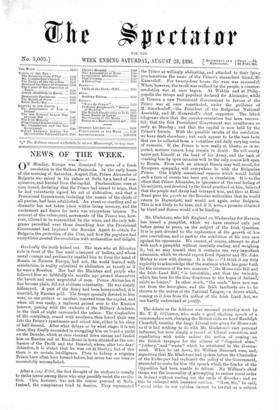Gradually the truth leaked out. The man who at Slivnitza
rode in front of the line amid a tempest of bullets, and whose moral courage and pertinacity enabled him to force the hand of Russia in Eastern Europe, had not, the world learned with satisfaction, in reality submitted to abdication as tamely as if he were a Bourbon. Nor had the Ministers and people who followed him so faithfully six months ago proved themselves the basest and most ungrateful of men. Prince Alexander, it has become plain, did not abdicate voluntarily. He was simply kidnapped. A part of the Army had been honeycombed, it is asserted, by Russian gold. The troops specially devoted to him were, on one pretext or another, removed from the capital, and when all was ready, a regiment gained over to the Russian interest, joining with the students of the Military Academy, in the dead of night surrounded the palace. The ringleaders of the conspiracy, armed with revolvers, then forced their way into the Prince's apartments and seized him, either in his sleep or half-dressed. After what delays or by what stages it is not clear, they finally succeeded in smuggling him on board a yacht on the Danube, which at once steamed down stream and landed him on Russian soil at Reni-Russi (a town situated at the con- fluence of the Pruth and the Danube), where, after two days' detention, it is stated that he was set at liberty ; but of this there is no certain intelligence. Plots to kidnap a reigning Prince have often been formed before, but never has one been so successfully accomplished.


































